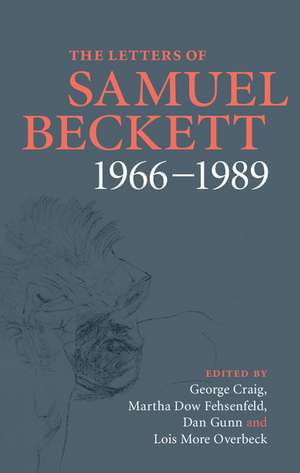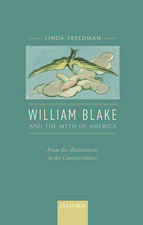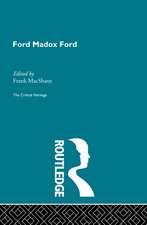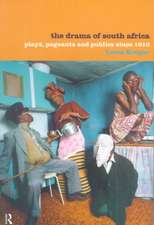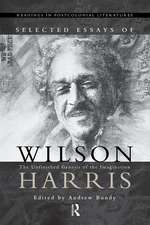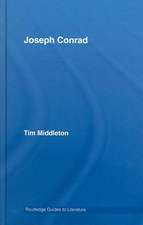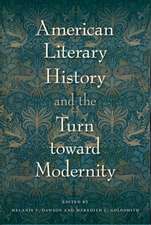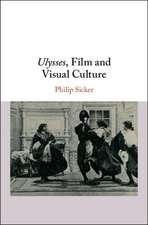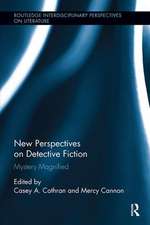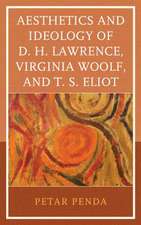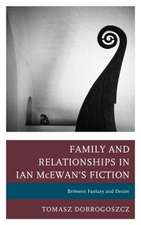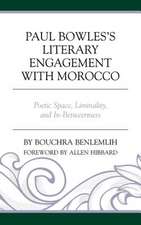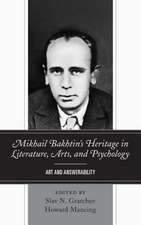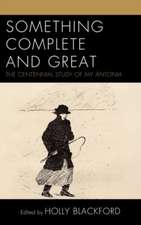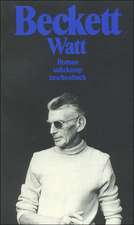The Letters of Samuel Beckett: Volume 4, 1966–1989: The Letters of Samuel Beckett
Autor Samuel Beckett Editat de George Craig, Martha Dow Fehsenfeld, Dan Gunn, Lois More Overbecken Limba Engleză Hardback – 28 sep 2016
Preț: 377.90 lei
Nou
Puncte Express: 567
Preț estimativ în valută:
72.32€ • 75.31$ • 61.12£
72.32€ • 75.31$ • 61.12£
Carte disponibilă
Livrare economică 17 februarie-03 martie
Preluare comenzi: 021 569.72.76
Specificații
ISBN-13: 9780521867962
ISBN-10: 0521867967
Pagini: 942
Ilustrații: 19 b/w illus.
Dimensiuni: 147 x 223 x 45 mm
Greutate: 1.39 kg
Editura: Cambridge University Press
Colecția Cambridge University Press
Seria The Letters of Samuel Beckett
Locul publicării:Cambridge, United Kingdom
ISBN-10: 0521867967
Pagini: 942
Ilustrații: 19 b/w illus.
Dimensiuni: 147 x 223 x 45 mm
Greutate: 1.39 kg
Editura: Cambridge University Press
Colecția Cambridge University Press
Seria The Letters of Samuel Beckett
Locul publicării:Cambridge, United Kingdom
Cuprins
List of illustrations; General introduction; French translator's preface George Craig; Editorial procedures; Acknowledgments; Permissions; Collections and abbreviations; Introduction to Volume 4 Dan Gunn; Letters, 1966–1989; Appendix: selection of letters from Samuel Beckett found after the appropriate volume of correspondence was published; Profiles; Bibliography of works cited; Index of recipients; Index of first names, abbreviations, and nicknames; Summary listing of Samuel Beckett's works, Volume 4; General index.
Recenzii
'Here is a book which, as soon as I could get sight of a copy, I could not stop myself reading straight through, nothing being more urgent to me … The temptation is only to quote. There is so much here of great value to those who study Beckett … Every word Beckett wrote as only he could write it. That is why, as Dan Gunn says in his excellent introduction to this final volume, though the writing of letters can seem like a diversion from, or even obstruction of, his work, 'the writing of letters is also that work'. Now we can read them. This is a great piece of publication.' David Sexton, The Evening Standard
'The editing of this volume, as of the previous three, is phenomenal in its thoroughness, doggedness and clarity. The editors explain abbreviations, so that, by 'Kind PA on HD. DM could direct', Beckett means: 'Kind of Peggy Ashcroft to ask to play Winnie in Happy Days. Donald McWhinnie could direct it.' Their loving (it is the only word) attentiveness makes you feel you know the modernist dinosaur better than before. And feel absurdly pleased that he comes across as a good man.' John Walsh, The Sunday Times
'Krapping away here to no little avail,' writes Beckett to the actor Patrick Magee in September 1969. To 'no little avail', note, not to 'little or no': there is a difference. It's the difference that Beckett makes - I can't go on, I'll go on, and all that … a lifetime's correspondence that stands as a necessary complement to Beckett's published work.' Ian Sansom, The Spectator
'In spite of a few flashes of his earlier manner (one message to a producer reads, in its entirety, 'No'), the letters are mostly in awe-inspiring accordance with his late-life image as Saint Samuel of the Void. Whether he's discussing French grammar with the postman, quietly giving his Nobel winnings to needy artists, or lavishing polite attention on his younger colleagues' avant garde manuscripts ('I don't see how you can cut the poem … All I meant was that its association with the bacon-stroking seemed unadvisable'), it's hard not to think of his tribute to Joyce: 'heroic work, heroic being'.' Christopher Taylor, Financial Times
'Volume IV, despite an inevitable, general lessening, has its many moments of illumination, indeed of splendour, even as the light of Beckett's life and work dims … As always with Beckett, of course, laughter, however bleak, will keep breaking through. His wordplay becomes, if anything, more ingenious and mordantly funny the older he gets … In this volume we are also offered repeated instances of Beckett's unfailing kindness and generosity … it would be churlish and ungrateful, here at the end, not to acknowledge the dedication, hard work and love that have gone into the making of this splendid monument to a great artist.' John Banville, The Daily Telegraph
'It will be a most difficult job,' Samuel Beckett writes to Martha Dow Fehsenfeld in March 1985, authorising her to edit his letters. And indeed it has been. The letters published in the 750 pages of this fourth volume represent only a fraction of those available. For each one Beckett's notoriously illegible handwriting had to be deciphered, his oblique references to people and places glossed, his glancing literary quotations hunted down in English, French, German and Italian. So all praise to the editorial team: Fehsenfeld herself; Lois More Overbeck, the general editor; Dan Gunn, who contributed the magisterial introduction to this volume; and George Craig, with his brilliant French translator's preface. No one will envy them their 31 years' hard labour; all readers will appreciate their extraordinary achievement.' Nicholas Grene, The Irish Times
'I was close to tears reading these last letters: especially since Beckett's fixation on death features so prominently in much of his work. A writer of Beckett's magnitude and originality only comes along once every few centuries. Therefore any words they put down on paper ought to be of significant interest to global literary culture, and to posterity. And this final volume of letters certainly is.' J. P. O'Malley, Sunday Independent
'The fourth and final volume of these impeccably edited letters covers the years in which Beckett won the Nobel prize but became 'weary with words' … The letters do throw a remarkable light on the work, and the man. Not an explanatory one exactly, but one that inspires fresh interpretations … The editorship of his letters provides a model of scholarship and a masterclass in selection. No page in this volume is without a point of interest. Dan Gunn's introduction (which, alongside those to the first three volumes, would make an excellent freestanding short book) explains why the editors felt able to include letters that don't strictly obey Beckett's injunction on the personal.' Chris Power, The Guardian
'The final volume of the superb Cambridge edition of Beckett's letters covers the final two decades of the author's life, when his existence might be said to have become more Beckettian in the sense of having moulded itself to the conditions of enduring decrepitude which had for so long been an imaginative resource for him … These later letters tend to be shorter, sometimes even becoming telegrammatic in their brevity and parataxis. Occasionally this produces lucid crystals of concentrated commentary.' David Wormersley, Standpoint
'Superb annotation throughout the four volumes of the letters … surely one of the greatest editions of letters ever published.' Fintan O'Toole, The New York Review of Books
'The editors have accomplished an extraordinary feat of editorial work to make the letters an enriching and informative read … It is one of the strengths of these volumes that, in addition to the full letters printed, the footnotes contain relevant extracts from other letters to other correspondents which illuminatingly gloss some or all of the contents of the main letter … These extraordinary letters will be of value not just to people interested in Beckett but to an even larger general audience. They will have, as I have sought to show, a whole extra layer of meaning and interest for an Irish audience. In reading them, I felt (to paraphrase what Beckett wrote in one of his prose fictions) such pleasure that pleasure was not the word.' Anthony Roche, Dublin Review of Books
'Although I understand that Jojo Moys and Jeffrey Archer may have sold more copies, the book of the year for me by far was The Letters of Samuel Beckett Vol IV: 1966-1989.' David Sexton, 'Best Books of the Year', The Evening Standard
'The Letters of Samuel Beckett Vol IV: 1966-1989, edited by George Craig, Martha Dow Fehsenfeld, Dan Gunn and Lois More Overbeck. 'I hope words have now failed me,” wrote Beckett in his last year. But they never did.' Jane Shilling, 'Best Books of the Year', The Evening Standard
'Here is the fourth and final instalment in the monumental Letters of Samuel Beckett, consisting of a treasure trove of the playwright's writing to a wide range of correspondents … The book has been edited meticulously by an international team of scholars, and Beckett's many letters in French are translated with considerable wit and style.' James Moran, The Tablet
'The editors deserve all possible praise. They have been gathering letters for many years and have done their utmost to decipher the author's difficult handwriting. They have provided each letter with explanatory notes that attach it to its biographical context. Their care has resulted in turning this extensive correspondence into an important part of the oeuvre.' Carl Rudbeck, translated from Svenska Dagbladet
'The editing of this volume, as of the previous three, is phenomenal in its thoroughness, doggedness and clarity. The editors explain abbreviations, so that, by 'Kind PA on HD. DM could direct', Beckett means: 'Kind of Peggy Ashcroft to ask to play Winnie in Happy Days. Donald McWhinnie could direct it.' Their loving (it is the only word) attentiveness makes you feel you know the modernist dinosaur better than before. And feel absurdly pleased that he comes across as a good man.' John Walsh, The Sunday Times
'Krapping away here to no little avail,' writes Beckett to the actor Patrick Magee in September 1969. To 'no little avail', note, not to 'little or no': there is a difference. It's the difference that Beckett makes - I can't go on, I'll go on, and all that … a lifetime's correspondence that stands as a necessary complement to Beckett's published work.' Ian Sansom, The Spectator
'In spite of a few flashes of his earlier manner (one message to a producer reads, in its entirety, 'No'), the letters are mostly in awe-inspiring accordance with his late-life image as Saint Samuel of the Void. Whether he's discussing French grammar with the postman, quietly giving his Nobel winnings to needy artists, or lavishing polite attention on his younger colleagues' avant garde manuscripts ('I don't see how you can cut the poem … All I meant was that its association with the bacon-stroking seemed unadvisable'), it's hard not to think of his tribute to Joyce: 'heroic work, heroic being'.' Christopher Taylor, Financial Times
'Volume IV, despite an inevitable, general lessening, has its many moments of illumination, indeed of splendour, even as the light of Beckett's life and work dims … As always with Beckett, of course, laughter, however bleak, will keep breaking through. His wordplay becomes, if anything, more ingenious and mordantly funny the older he gets … In this volume we are also offered repeated instances of Beckett's unfailing kindness and generosity … it would be churlish and ungrateful, here at the end, not to acknowledge the dedication, hard work and love that have gone into the making of this splendid monument to a great artist.' John Banville, The Daily Telegraph
'It will be a most difficult job,' Samuel Beckett writes to Martha Dow Fehsenfeld in March 1985, authorising her to edit his letters. And indeed it has been. The letters published in the 750 pages of this fourth volume represent only a fraction of those available. For each one Beckett's notoriously illegible handwriting had to be deciphered, his oblique references to people and places glossed, his glancing literary quotations hunted down in English, French, German and Italian. So all praise to the editorial team: Fehsenfeld herself; Lois More Overbeck, the general editor; Dan Gunn, who contributed the magisterial introduction to this volume; and George Craig, with his brilliant French translator's preface. No one will envy them their 31 years' hard labour; all readers will appreciate their extraordinary achievement.' Nicholas Grene, The Irish Times
'I was close to tears reading these last letters: especially since Beckett's fixation on death features so prominently in much of his work. A writer of Beckett's magnitude and originality only comes along once every few centuries. Therefore any words they put down on paper ought to be of significant interest to global literary culture, and to posterity. And this final volume of letters certainly is.' J. P. O'Malley, Sunday Independent
'The fourth and final volume of these impeccably edited letters covers the years in which Beckett won the Nobel prize but became 'weary with words' … The letters do throw a remarkable light on the work, and the man. Not an explanatory one exactly, but one that inspires fresh interpretations … The editorship of his letters provides a model of scholarship and a masterclass in selection. No page in this volume is without a point of interest. Dan Gunn's introduction (which, alongside those to the first three volumes, would make an excellent freestanding short book) explains why the editors felt able to include letters that don't strictly obey Beckett's injunction on the personal.' Chris Power, The Guardian
'The final volume of the superb Cambridge edition of Beckett's letters covers the final two decades of the author's life, when his existence might be said to have become more Beckettian in the sense of having moulded itself to the conditions of enduring decrepitude which had for so long been an imaginative resource for him … These later letters tend to be shorter, sometimes even becoming telegrammatic in their brevity and parataxis. Occasionally this produces lucid crystals of concentrated commentary.' David Wormersley, Standpoint
'Superb annotation throughout the four volumes of the letters … surely one of the greatest editions of letters ever published.' Fintan O'Toole, The New York Review of Books
'The editors have accomplished an extraordinary feat of editorial work to make the letters an enriching and informative read … It is one of the strengths of these volumes that, in addition to the full letters printed, the footnotes contain relevant extracts from other letters to other correspondents which illuminatingly gloss some or all of the contents of the main letter … These extraordinary letters will be of value not just to people interested in Beckett but to an even larger general audience. They will have, as I have sought to show, a whole extra layer of meaning and interest for an Irish audience. In reading them, I felt (to paraphrase what Beckett wrote in one of his prose fictions) such pleasure that pleasure was not the word.' Anthony Roche, Dublin Review of Books
'Although I understand that Jojo Moys and Jeffrey Archer may have sold more copies, the book of the year for me by far was The Letters of Samuel Beckett Vol IV: 1966-1989.' David Sexton, 'Best Books of the Year', The Evening Standard
'The Letters of Samuel Beckett Vol IV: 1966-1989, edited by George Craig, Martha Dow Fehsenfeld, Dan Gunn and Lois More Overbeck. 'I hope words have now failed me,” wrote Beckett in his last year. But they never did.' Jane Shilling, 'Best Books of the Year', The Evening Standard
'Here is the fourth and final instalment in the monumental Letters of Samuel Beckett, consisting of a treasure trove of the playwright's writing to a wide range of correspondents … The book has been edited meticulously by an international team of scholars, and Beckett's many letters in French are translated with considerable wit and style.' James Moran, The Tablet
'The editors deserve all possible praise. They have been gathering letters for many years and have done their utmost to decipher the author's difficult handwriting. They have provided each letter with explanatory notes that attach it to its biographical context. Their care has resulted in turning this extensive correspondence into an important part of the oeuvre.' Carl Rudbeck, translated from Svenska Dagbladet
Descriere
This final volume in the acclaimed edition of The Letters of Samuel Beckett covers the last twenty-four years of Beckett's life and work.
